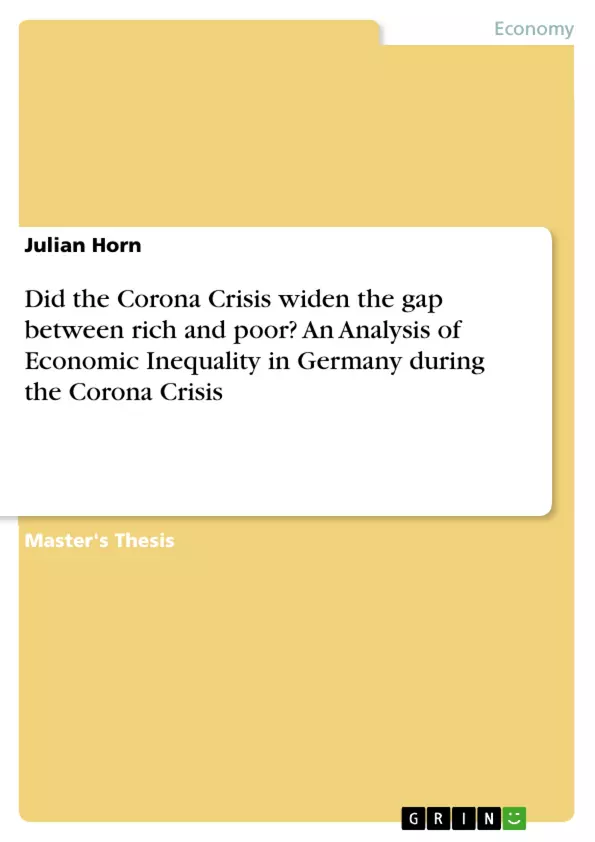
Did the Corona Crisis widen the gap between rich and poor? An Analysis of Economic Inequality in Germany during the Corona Crisis
Masterarbeit, 2021
77 Seiten, Note: 1,3
Leseprobe
Inhaltsverzeichnis (Table of Contents)
- Introduction
- Research questions and hypotheses
- Methodology and data basis
- The term inequality and its key figures
- The concepts of income
- Market and net income
- Net equivalence income
- The concept of wealth
- The concept of poverty
- Gini coefficient and other indicators
- Framework and Development of economic inequality in Germany
- Economic framework in Germany
- Solid economic growth until the Corona crisis
- Labour market situation and the importance of short-time work
- Distribution of national income
- Income inequality in Germany
- Development of net equivalised disposable income
- Decline in wage inequality with gender pay gap remaining
- Development of the Gini coefficient and other indicators
- Trends in income poverty
- Decrease in material deprivation
- Developments at the upper end of the income distribution
- Asset distribution in Germany
- Gini coefficient and percentile distributions
- Relationship between income and assets
- Asset distribution in international comparison
- Changes in economic inequality due to the Corona crisis
- Short-term effects on the labour market
- The significant role of short-time allowances
- Marginally employed persons face major challenges due to the crisis
- Effects on market and disposable household income
- The Gender Pay Gap in the Corona Crisis
- Income inequality during the Corona pandemic in Europe
- Short-term effects on asset distribution
- Policy instruments to reduce economic inequality
- Financial support for the self-employed persons
- Assistance for marginally employed persons
- Spreading the costs of the pandemic fairly
- Limitations
Zielsetzung und Themenschwerpunkte (Objectives and Key Themes)
This Master's thesis investigates the impact of the Corona crisis on economic inequality in Germany. It aims to answer the research question of how the economic inequality in Germany changed during the crisis. Through a deductive literature analysis, the study explores the short-term effects of the crisis on income and wealth distribution, with a focus on the role of social security measures, labour market adjustments, and asset disparities.
- Economic Inequality in Germany
- Impact of the Corona Crisis
- Income and Wealth Distribution
- Role of Social Security Measures
- Labour Market Adjustments
Zusammenfassung der Kapitel (Chapter Summaries)
The thesis begins by defining key concepts related to economic inequality, including income, wealth, and poverty. It then provides an overview of the economic framework in Germany before the crisis, highlighting factors like economic growth, labour market dynamics, and the distribution of national income. The study then analyzes trends in income and wealth inequality in Germany prior to the crisis, focusing on the development of income and asset distributions, the Gini coefficient, and poverty indicators.
The fourth chapter investigates the short-term effects of the Corona crisis on economic inequality in Germany. It examines the impact of the crisis on the labour market, particularly the role of short-time work and the challenges faced by marginally employed individuals. The chapter also analyzes the effects of the crisis on income distribution, exploring changes in market and disposable household income and the gender pay gap. Finally, it provides an initial assessment of the impact of the crisis on asset distribution.
The fifth chapter explores policy instruments aimed at mitigating economic inequality in the wake of the Corona crisis. It focuses on financial support for self-employed individuals, assistance for marginally employed persons, and strategies for fairly distributing the costs of the pandemic.
Schlüsselwörter (Keywords)
This thesis focuses on key aspects of economic inequality, including income inequality, wealth inequality, poverty, the impact of the Corona crisis on economic disparities in Germany, social security measures, labour market changes, asset distribution, and policy instruments to reduce inequality.
Did the Corona crisis increase economic inequality in Germany?
While market incomes were hit, social security measures like short-time work (Kurzarbeit) helped stabilize disposable incomes for many, preventing a massive surge in immediate inequality, though certain groups were hit harder.
How did short-time work (Kurzarbeit) affect the labor market?
Kurzarbeit was a crucial instrument that prevented mass unemployment by allowing companies to keep staff during lockdowns, thereby stabilizing the income of millions of employees.
Which groups were most negatively affected by the crisis?
Marginally employed persons (Minijobbers) and self-employed individuals faced significant challenges, as they often had less access to traditional social security benefits compared to full-time employees.
What is the Gini coefficient and what does it show for Germany?
The Gini coefficient measures income or wealth distribution. For Germany, it shows a relatively stable but high level of inequality, which the Corona crisis tested through shifts in market income.
How was wealth distribution impacted in the short term?
Short-term effects on wealth were less clear than income, but stock market fluctuations and savings rate increases among higher-income households potentially widened the wealth gap.
What policy instruments were suggested to reduce inequality?
Suggestions include better financial support for the self-employed, assistance for marginal workers, and discussions on how to fairly distribute the long-term costs of the pandemic.
Details
- Titel
- Did the Corona Crisis widen the gap between rich and poor? An Analysis of Economic Inequality in Germany during the Corona Crisis
- Hochschule
- Hochschule für Wirtschaft und Recht Berlin
- Note
- 1,3
- Autor
- Julian Horn (Autor:in)
- Erscheinungsjahr
- 2021
- Seiten
- 77
- Katalognummer
- V1165748
- ISBN (eBook)
- 9783346575302
- ISBN (Buch)
- 9783346575319
- Sprache
- Englisch
- Schlagworte
- Corona Economic Inequality Germany Corona Crisis Rich Poor Gap
- Produktsicherheit
- GRIN Publishing GmbH
- Preis (Ebook)
- US$ 31,99
- Preis (Book)
- US$ 42,99
- Arbeit zitieren
- Julian Horn (Autor:in), 2021, Did the Corona Crisis widen the gap between rich and poor? An Analysis of Economic Inequality in Germany during the Corona Crisis, München, Page::Imprint:: GRINVerlagOHG, https://www.diplomarbeiten24.de/document/1165748










